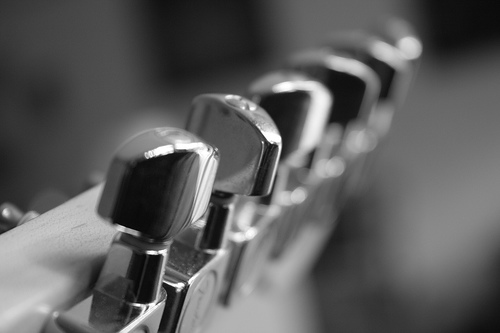Still, locking tuners do have significant advantages over traditional designs. While they won’t lock your guitar perfectly in tune, they will lock your strings in place, preventing intonation changes from the winding loosening or the string slipping. The biggest benefit for most people, though, is how much they speed up the process of changing strings. New strings are locked in at a single twist of a screw, eliminating the need to tie the strings in knots—the most time-consuming and frustrating part of changing strings for most players.
If you’re thinking about making the switch to locking tuners, check out the four models on this list, all of which are popular options with professional guitarists.
These are, in our humble opinion, the 4 best locking tuners on the market:
Fender Chrome Locking Tuners
These are the same tuners that come installed on Fender’s American Deluxe series of guitars, and if you have a Fender like a Stratocaster or a Telecaster with a locking tuner system, they’ll be a drop-in replacement; if you play another brand or model, they’ll be a slight but easy modification on any right-headstock guitar.
They’re chrome-plated both for looks and for strength. Fender pays the same careful attention to their guitar hardware as they do to the other aspects of the instrument, and these tuners will give you years of consistent, reliable performance. With Fender locking tuners on your guitar, you’ll spend less time worry about your intonation, leaving you more energy and time to focus on your sound.
Grover 502C Roto-Grip Locking Rotomatic Tuners
These tuners from Grover are a drop-in installation for guitars that use a 3X3 tuner configuration and have an 18:1 gear ratio. This includes a lot of popular guitars, including many Yamaha models. They also come with all the hardware you’ll need to mount them—potentially saving you a trip to the repair shop for the installation. The Roto-Grip design (see full specs) gives you rock solid tuning that you can count on in the long-term. And in every sense—not only will these keep your instrument in tune longer each time you adjust your strings, they’ll continue to give you a reliable, steady tone for the long-term. These are among the best locking tuners you can buy.
Sperzel 6 In-Line Locking Tuners
Sperzel is the most popular brand of after-market electric guitar tuners, and their locking tuners are used by professionals of all genres, and on a wide variety of brands and styles of instrument. This design is an in-line model (see full specs), meaning it’s for guitars with tuners all on one side of the headstock. They not only bring you all the usual efficiency benefits of locking tuners but also use a staggered post height that does away with the need for string retainers, giving you a more open and sensitive response across your strings. It’s the way these tuners free up your tone that has made them so popular as an after-market upgrade, and what earns their place on any list of the best locking tuners for the money.
Hipshot 6GLO Grip Lock Tuning Set Chrome
When it comes to the overall look of your guitar, the headstock is often one of the more visible and distinctive parts. A lot of locking tuners have a bulky, utilitarian look that many people find aesthetically less pleasing than traditional tuners—part of the reason they’re avoiding the switch.
This is not the case with these 6GLO Hipshot tuners. They’re relatively slim and unobtrusive with an attractive black chrome finish that gives your headstock a unique profile. And they sound as good as they look, with a smooth response and consistent intonation on par with the other big names on the market. If looks alone have kept you from exploring locking tuners before, thanks to these Hipshot tuners, you may just be in luck. These should be on anyone’s list of the best guitar locking tuners.
Locking vs. Traditional Tuners
It doesn’t matter how perfect your technique is or what kind of gear you have if your instrument won’t stay in tune with itself. Despite their importance to your overall sound, much less attention is given to debates over tuner styles and models than is given to other components of your guitar, like the bridge, strings, and pickups. These are certainly important to your tone—but again, they won’t matter if your intonation’s off.
As mentioned earlier, locking tuners will not prevent your instrument from ever going out of tune. Your strings will naturally stretch and shift as you play them, and environmental factors like temperature and humidity will also impact your intonation. Guitar locking tuners will minimize the effects of playing on your intonation, however, meaning that you’ll likely have to tune your instrument less frequently than you do with traditional tuners.
For many people, the advantage of locking tuners isn’t necessarily anything to do with intonation, but is more for the sake of convenience when changing the strings. With traditional tuners, you tighten your strings by winding them tight and tying them off in a knot. With locking tuners, tightening the strings takes just a half turn of the tuning peg—a much quicker and more convenient way to put new strings on your instrument.
The most commonly cited disadvantage of even the best locking tuners is their appearance. Because they involve a larger mechanism, some people find they look bulky and unsightly on their headstock. Buying the slimmer and more aesthetically attractive versions of locking tuners listed above can be one way to avoid this disadvantage, but for those who prefer the look of a traditional tuner, even the relatively slim and attractive versions of locking tuners aren’t quite right.
If you already have locking tuners on your instrument, this is likely the kind of tuner you’ll end up buying to replace your tuners when they wear out. If your guitar currently has traditional tuners, however, switching to locking tuners will require some modification of your instrument. While this is relatively unobtrusive—certainly not as extensive a modification as altering your pickups, and around the same amount of effort that’s required to install a new style of bridge—it is an additional commitment of time and money that you should keep in mind if you want to switch to locking tuners.
If you’re not sure whether you want to switch to locking tuners, take your instrument in to your local music shop; they’ll be able to guide you as to how much the modification will cost you and what the ultimate effect will be on your headstock. Good luck!








